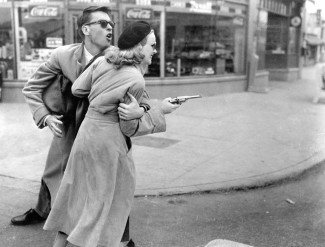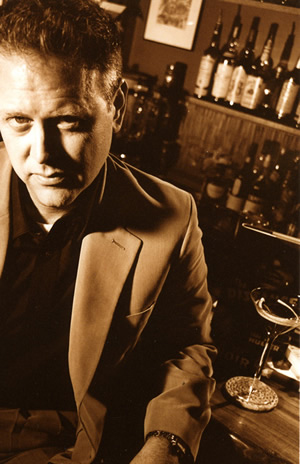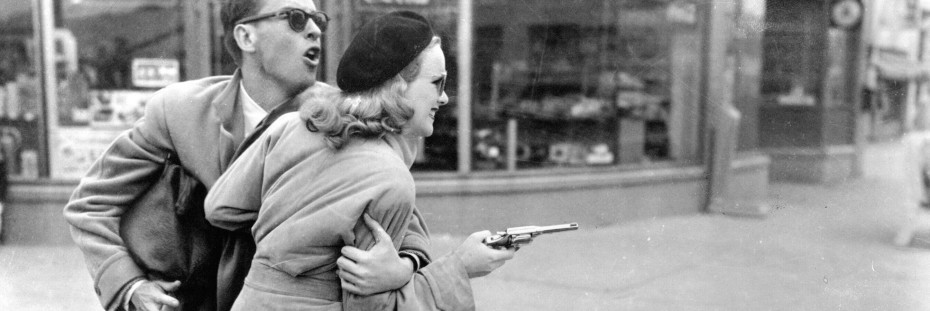INTERVIEW: Noir expert Eddie Muller discusses legacy of ‘Gun Crazy’

Gun Crazy, directed by Joseph H. Lewis and penned by blacklisted screenwriter Dalton Trumbo, is a classic film noir that is often referred to as some of the best filmmaking from the the 1940s. Film Forum in New York City will host a special screening of the classic movie 7 p.m. Saturday, June 6, with an introduction by noir expert Eddie Muller.
Muller founded the Film Noir Foundation and will host TCM’s “Summer of Darkness” series, set to kick off June 5. He’s also the author of Gun Crazy: The Origin of American Outlaw Cinema, which will be available for sale at a book signing following the screening.
The movie profiles a bank robbery shot from the inside of the getaway car. Gun Crazy stars Peggy Cummins and John Dall; it was originally believed to have been written by MacKinlay Kantor. However, it’s actually the work of Trumbo. That doesn’t mean Kantor’s vision didn’t make it on the screen. Muller will likely offer context during his introduction, and more information can be found in his new book.
Recently, Hollywood Soapbox exchanged emails with Muller on the significance of the movie and the noir genre. There has been slight editing for style.
You have been quoted as saying that Gun Crazy is the most exciting, dynamic and influential noir movie ever made. What makes the movie deserve such accolades?
The filmmaking itself was influential on the French New Wave critics turned directors, because it’s a combination of traditional studio techniques and progressive, cinema verite style “guerrilla” filmmaking, especially all the exterior scenes shot on location. It’s more subtle influence was in starting, albeit subversively, to erode the constraints of the Production Code in regards to depicting amoral behavior by young attractive protagonists. How this came to happen — it wasn’t entirely intentional — [is] the major theme of my book.

Could you explain to audience members how the film connects to Dalton Trumbo and the Hollywood blacklist?
The King Bros., who produced the film, had invested (for them) a substantial amount of money and time in MacKinlay Kantor, the creator of the story and screenplay. But they couldn’t arrive at a script that was actually workable, from either a narrative or production standpoint. Frank King followed the HUAC [House Un-American Activities Committee] hearings in Washington, and when he realized that Trumbo was going to be blacklisted, he was the first person in Hollywood to secretly employ him to rewrite a script. That was Gun Crazy. Contrary to popular belief, Trumbo did not feel exploited. He was grateful, and remained friends and colleagues with Frank King for the rest of his professional life. In fact, Trumbo [wrote] the script for the last film King produced, in 1967.
You’ve built a career out of exploring noir films. What is it about these iconic movies that inspires you so much?
They’re the perfect storm, artistically. An organic artistic movement. Not only the cross-pollination of American hard boiled fiction with the style of European expressionism and all that, but they’re a cultural and political time capsule — in popular entertainment form — of an astounding time in U.S. history. The way the politics of the era affected show business puts a fascinating edge on all of it. On top of that, the style is extraordinary, and the performers absolutely indelible.
In the research on Gun Crazy for your new book, what was one of the most surprising revelations?
So many of the iconic scenes in the film that have long been credited to director Joe Lewis actually existed in the earliest drafts of Kantor’s screenplay. For much of its long gestation, almost five years, this was Kantor’s movie. Lewis came to the party late, only a month before shooting began. But over time, it’s become known [as] “A Film by Joseph H. Lewis,” and MacKinlay Kantor has been completely forgotten. How it went from being one man’s dream to another man’s dream [is] what the book is essentially about.
By John Soltes / Publisher / John@HollywoodSoapbox.com
- Eddie Muller will introduce Gun Crazy 7 p.m. Saturday, June 6 at Film Forum in New York City. Click here for more information.

